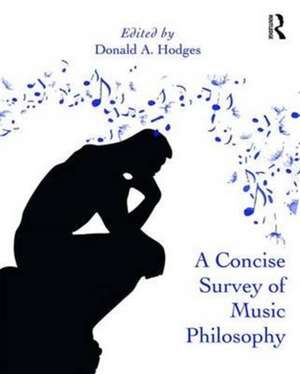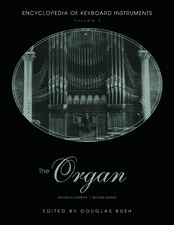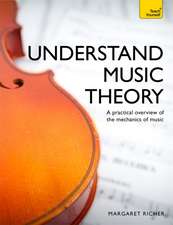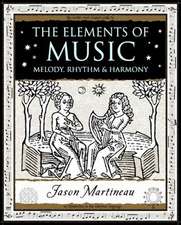A Concise Survey of Music Philosophy
Autor Donald A. Hodgesen Limba Engleză Paperback – 4 oct 2016
Frequently, music philosophy courses are taught in such a way that the teacher, as well as the textbook used, promotes a particular viewpoint. A Concise Survey of Music Philosophy presents the most current, prevalent philosophies for consideration. Students think through different issues and consider practical applications.
There are numerous musical examples, each with links from the author’s home website to online video performances. Examples are largely from the Western classical canon, but also jazz, popular, and world music styles. In the last two chapters, students apply their views to practical situations and learn the differences between philosophy and advocacy.
"Hodges has written an excellent resource for those wanting a short—but meaningful—introduction to the major concepts in music philosophy. Applicable to a number of courses in the music curriculum, this much-needed book is both accessible and flexible, containing musical examples, tables and diagrams, and additional readings that make it particularly useful for a student's general introduction to the topic. I especially like the emphasis on the personal development of a philosophical position, which makes the material especially meaningful for the student of music."
—Peter R. Webster, Scholar-in-Residence, Thornton School of Music, University of Southern California, USA
| Toate formatele și edițiile | Preț | Express |
|---|---|---|
| Paperback (1) | 494.14 lei 6-8 săpt. | |
| Taylor & Francis – 4 oct 2016 | 494.14 lei 6-8 săpt. | |
| Hardback (1) | 1283.60 lei 6-8 săpt. | |
| Taylor & Francis – 30 sep 2016 | 1283.60 lei 6-8 săpt. |
Preț: 494.14 lei
Nou
Puncte Express: 741
Preț estimativ în valută:
94.55€ • 98.99$ • 78.24£
94.55€ • 98.99$ • 78.24£
Carte tipărită la comandă
Livrare economică 07-21 aprilie
Preluare comenzi: 021 569.72.76
Specificații
ISBN-13: 9781138954519
ISBN-10: 1138954519
Pagini: 330
Ilustrații: 190
Dimensiuni: 191 x 235 x 21 mm
Greutate: 0.57 kg
Ediția:1
Editura: Taylor & Francis
Colecția Routledge
Locul publicării:Oxford, United Kingdom
ISBN-10: 1138954519
Pagini: 330
Ilustrații: 190
Dimensiuni: 191 x 235 x 21 mm
Greutate: 0.57 kg
Ediția:1
Editura: Taylor & Francis
Colecția Routledge
Locul publicării:Oxford, United Kingdom
Cuprins
Section I: Beginning the Journey 1. The Plan and Purpose of This Book / 2. Science and Religion / 3. Knowledge and Education / 4. Beauty / 5. Emotion / 6. Aesthetics / 7. A Philosophical Framework Section II: A Review of Major Music Philosophies 8. Contributions to Music Philosophy from the Ancient Greeks / 9. From Classical Antiquity to the Renaissance / 10. Rationalism, Empiricism, and Idealism / 11. Formalism / 12. Expressionism / 13. Symbolism / 14. Phenomenology / 15. Pragmatism / 16. Social Philosophy / 17. Praxialism / 18. Feminism / 19. Postmodernism Section III: Making it Your Own 20. Articulating a Philosophy of Music / 21. Applying Your Philosophy / 22. Advocacy
Notă biografică
Donald A. Hodges was Covington Distinguished Professor and Director of the Music Research Institute of Music Education at the University of North Carolina, Greensboro, and author of Music in the Human Experience (Routledge 2011). He has taught university courses in Music for more than forty-two years.
Recenzii
"Hodges has written an excellent resource for those wanting a short—but meaningful—introduction to the major concepts in music philosophy. Applicable to a number of courses in the music curriculum, this much-needed book is both accessible and flexible, containing musical examples, tables and diagrams, and additional readings that make it particularly useful for a student's general introduction to the topic. I especially like the emphasis on the personal development of a philosophical position, which makes the material especially meaningful for the student of music."—Peter R. Webster, Scholar-in-Residence, Thornton School of Music, University of Southern California, USA
Descriere
A Concise Survey of Music Philosophy helps music students choose a philosophy that will guide them throughout their careers. The book is divided into three sections: central issues that any music philosophy ought to consider (e.g., beauty, emotion, and aesthetics); secondly, significant philosophical positions, exploring what major thinkers have had to say on the subject; and finally, opportunities for students to consider the ramifications of these ideas for themselves. Throughout the book, students are encouraged to make choices that will inform a philosophy of music and music education with which they are most comfortable to align.
Frequently, music philosophy courses are taught in such a way that the teacher, as well as the textbook used, promotes a particular viewpoint. A Concise Survey of Music Philosophy presents the most current, prevalent philosophies for consideration. Students think through different issues and consider practical applications.
There are numerous musical examples, each with links from the author’s home website to online video performances. Examples are largely from the Western classical canon, but also jazz, popular, and world music styles. In the last two chapters, students apply their views to practical situations and learn the differences between philosophy and advocacy.
"Hodges has written an excellent resource for those wanting a short—but meaningful—introduction to the major concepts in music philosophy. Applicable to a number of courses in the music curriculum, this much-needed book is both accessible and flexible, containing musical examples, tables and diagrams, and additional readings that make it particularly useful for a student's general introduction to the topic. I especially like the emphasis on the personal development of a philosophical position, which makes the material especially meaningful for the student of music."
—Peter R. Webster, Scholar-in-Residence, Thornton School of Music, University of Southern California, USA
Frequently, music philosophy courses are taught in such a way that the teacher, as well as the textbook used, promotes a particular viewpoint. A Concise Survey of Music Philosophy presents the most current, prevalent philosophies for consideration. Students think through different issues and consider practical applications.
There are numerous musical examples, each with links from the author’s home website to online video performances. Examples are largely from the Western classical canon, but also jazz, popular, and world music styles. In the last two chapters, students apply their views to practical situations and learn the differences between philosophy and advocacy.
"Hodges has written an excellent resource for those wanting a short—but meaningful—introduction to the major concepts in music philosophy. Applicable to a number of courses in the music curriculum, this much-needed book is both accessible and flexible, containing musical examples, tables and diagrams, and additional readings that make it particularly useful for a student's general introduction to the topic. I especially like the emphasis on the personal development of a philosophical position, which makes the material especially meaningful for the student of music."
—Peter R. Webster, Scholar-in-Residence, Thornton School of Music, University of Southern California, USA





![Write Songs from Scratch [With CD (Audio)]](https://i1.books-express.ro/bt/9780851623511/write-songs-from-scratch-with-cd-audio.jpg)

